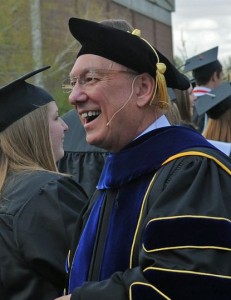Dr. David Wendler
 We praise God for 10 years of the MLC master’s program—10 years of high-quality instruction and high-speed growth—all fueled by the desire to serve God and further the gospel. It was in the late 90s when Dr. John Isch, then director of special services (continuing ed), and Dr. David Wendler, chair of the education division, first asked the question:
We praise God for 10 years of the MLC master’s program—10 years of high-quality instruction and high-speed growth—all fueled by the desire to serve God and further the gospel. It was in the late 90s when Dr. John Isch, then director of special services (continuing ed), and Dr. David Wendler, chair of the education division, first asked the question:Was it time for a master’s degree in education at MLC?
Other master’s programs were available to WELS teachers, but they weren’t founded on Lutheran educational principles. Might an MLC program serve the specific needs of WELS teachers? Might it add to WELS teacher proficiency and school credibility? And might schools with more credibility be more attractive to the unchurched, allowing a wider sharing of the gospel?
With the support of the WELS Commission on Lutheran Schools, Dr. Isch took the lead by conducting a feasibility study. The results were reported to the 1999 WELS Convention—and they were positive. Two years later, the 2001 convention approved the addition of a master’s degree in education at MLC.
With synod approval, the really difficult work began. Again, Dr. Isch did most of the heavy lifting. He conducted a needs analysis to determine what teachers wanted: types of courses, comfortable price points, and delivery methods (on campus, on location, or online). He directed the construction of the curriculum, developed a policy manual, and contributed to the lengthy application sent to the Higher Learning Commission (HLC).
“We really cannot overemphasize the role Dr. Isch played in the development of this program,” Dr. Wendler said.
Wendler also noted the extensive work done by his administrative assistant, Deb Plath, in producing the necessary documentation. And he recalled that his membership on the HLC proved beneficial, as it gave the college more insight into what the commission would require.
A few preliminary courses were offered in 2004, and then in 2005 the HLC granted official approval—not just for a master’s program, but for a completely online master’s program. The MLC MS-Ed was off and running.
Dr. Isch was the first director of graduate studies, continuing until 2007. In those two years alone, the enrollment jumped to 52.
In 2007, Dr. Wendler became interim director, serving for three years while John Meyer, called in 2008, finished his doctoral studies at the University of Minnesota. Since 2010, Dr. Meyer has served as director of graduate studies and has added director of continuing education to his title as well.
In 10 short years, under the guidance of these three men, the program has enjoyed explosive growth. The first graduation class, in 2008, consisted of two. Today 72 graduates put MS-Ed behind their name, and another 132 are enrolled.
The number of courses has grown to 46, and the faculty totals 26, including 17 adjunct instructors. In 2010, a fourth emphasis, educational technology, joined the first three: instruction, leadership, and special education.
“I always hoped the program would have over 100 students and continue to grow,” Wendler said. “That is now achieved. It’s time to set a new goal of 200-300 students. I’d like to see earning a master’s degree become part of the culture and expectation for all WELS teachers.
“There are so many benefits to getting a master’s degree,” he continued. “Teachers sense that their learning never ends. After some classroom experience, they can reflect on their practice and integrate new techniques. They learn from their peers and from college professors, including adjuncts from other colleges and universities. And finally, when they graduate, they have the increased credibility of a master’s degree.”
As Dr. Wendler considered the past decade and the decades to come, he said he’s impressed with the work Dr. John Meyer is doing. “As I visit other colleges and universities and compare our program with theirs, we stack up very well. And I’m glad we’re going to offer other master’s degrees, like the MS-Educational Administration and the MA-Theological Studies.”
Why are so many WELS teachers pursuing their graduate degree at MLC? They see it as faithfulness to their calling, a desire to be good stewards of the gifts God has given them and to become as proficient as possible in their vocation. Many also see how a master’s degree increases their own and their schools’ credibility.
This is especially important as schools reach out to the unchurched. People in their communities may not understand much about Lutheran education, but they do appreciate high-quality education delivered by highly trained teachers. Master’s degrees, much like teacher licensure and school accreditation, lend credibility to the school and serve the gospel.
“We don’t want any impediment that might hinder parents, members or non-members, from enrolling their children in our Lutheran schools,” said Dr. Wendler. “The gospel message of Christ’s redemptive work for their souls is too precious and important.”
He continues: “Our WELS school system has the potential to be our country’s leading example of teaching and learning effectiveness. That reputation for teachers and schools is simply a bridge to the much more important effectiveness that the Holy Spirit works through his gospel in the hearts of students who attend our schools.”
Written by Laurie Gauger-Hested





